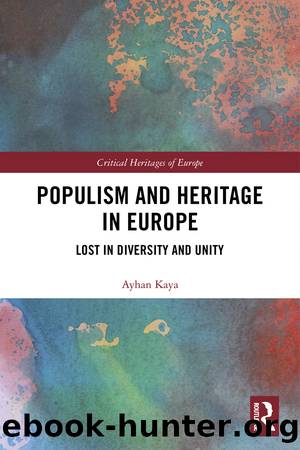Populism and Heritage in Europe by Ayhan Kaya

Author:Ayhan Kaya [Kaya, Ayhan]
Language: eng
Format: epub
Tags: Social Science, Archaeology, History, Europe, General, Political Science
ISBN: 9780429855436
Google: hMyxDwAAQBAJ
Publisher: Routledge
Published: 2019-09-25T04:58:54+00:00
4 Populism and heritage in the
Netherlands
The rise of right-wing populism in the Netherlands has followed a very different path, which has become a central concern in Dutch politics since 9/11. Starting with the success of Lijst Pim Fortuyn (LPM) in 2002, right-wing popular parties continued to gain ground with the Party for Freedom (PVV) and their popularity is maintained now with the Forum for Democracy (FvD), evidence that such parties have come a long way in mainstreaming themselves. This mainstreaming in the Netherlands and Europe depends on their capacity to âbashâ Islam. âBashing Islamâ has so far been in tandem with âbashing multiculturalismâ. Dutch right-wing populism is peculiar in the sense that it has mainstreamed itself by attracting more females and LGBTI individuals, who feel ontologically threatened by fundamentalist Islam. The criticism of a multiculturalist heritage is relational to the criticism of traditional institutions in the Netherlands, such as the mainstream media, political parties, and democratic institutions. That trust in traditional institutions has been gradually decreasing since the mid-1990s has strengthened the hands of right-wing populist parties reliant on a charismatic leadership style.
This chapter starts with a detailed analysis of Dutch pillarization and multiculturalism, which has a strong colonial legacy. The Netherlands is, historically, a segregated society in terms of ethno-cultural, religious, and social terms. It is therefore understandable that Muslim-origin immigrants have created their own community pillar over the course of time. However, Dutch multiculturalism has become contested since Muslim-origin migrants and their descendants gained visibility in the public space, as this has apparently disrupted the homogeneity of the nation. As will be discussed in detail, this perception is common among supporters of right-wing populism in Rotterdam, where the research team conducted its interviews. The chapter will also consider how the PVV has exploited the fear of Islam among native Dutch individuals by analysing the discontents of multicultural and colonial heritage expressed by supporters of right-wing populist parties. The main premise of this chapter is that some native individuals in the Netherlands have experienced diverse forms of socio-economic and nostalgic deprivation, resulting from globalization, diversity, multiculturalism and mobility challenging the established notions of the nation, culture, tradition, and heritage.
Download
This site does not store any files on its server. We only index and link to content provided by other sites. Please contact the content providers to delete copyright contents if any and email us, we'll remove relevant links or contents immediately.
| Anthropology | Archaeology |
| Philosophy | Politics & Government |
| Social Sciences | Sociology |
| Women's Studies |
Cecilia; Or, Memoirs of an Heiress — Volume 1 by Fanny Burney(32531)
Cecilia; Or, Memoirs of an Heiress — Volume 2 by Fanny Burney(31929)
Cecilia; Or, Memoirs of an Heiress — Volume 3 by Fanny Burney(31919)
The Great Music City by Andrea Baker(31905)
We're Going to Need More Wine by Gabrielle Union(19022)
All the Missing Girls by Megan Miranda(15898)
Pimp by Iceberg Slim(14468)
Bombshells: Glamour Girls of a Lifetime by Sullivan Steve(14041)
For the Love of Europe by Rick Steves(13831)
Talking to Strangers by Malcolm Gladwell(13334)
Norse Mythology by Gaiman Neil(13320)
Fifty Shades Freed by E L James(13218)
Mindhunter: Inside the FBI's Elite Serial Crime Unit by John E. Douglas & Mark Olshaker(9301)
Crazy Rich Asians by Kevin Kwan(9263)
The Lost Art of Listening by Michael P. Nichols(7482)
Enlightenment Now: The Case for Reason, Science, Humanism, and Progress by Steven Pinker(7292)
The Four Agreements by Don Miguel Ruiz(6731)
Bad Blood by John Carreyrou(6602)
Weapons of Math Destruction by Cathy O'Neil(6250)
